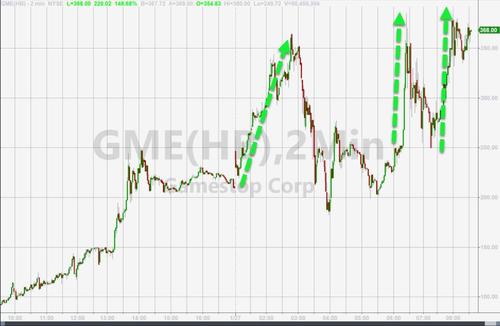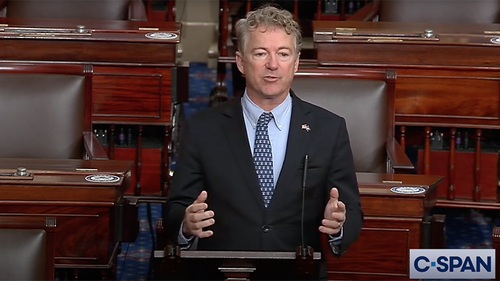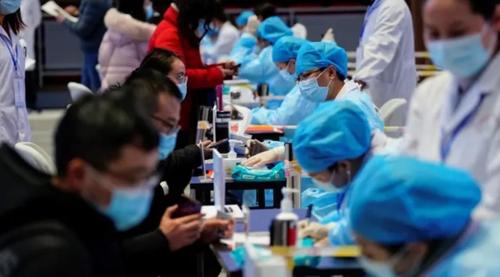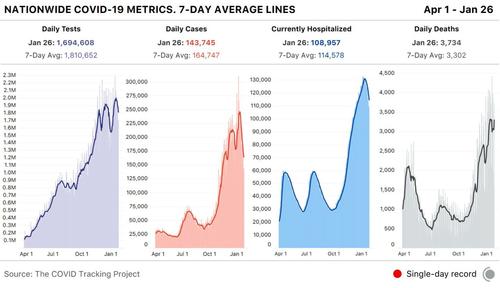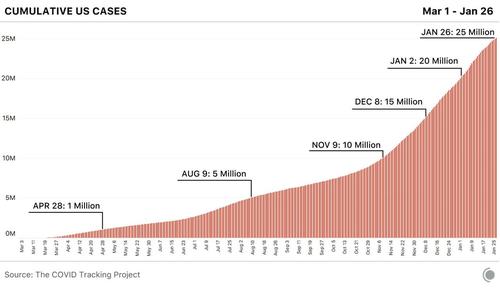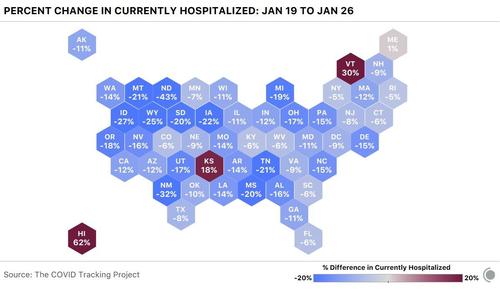Yesterday Pres. Biden issued an Executive Order on Reforming Our Incarceration System to Eliminate the Use of Privately Operated Criminal Detention Facilities. The operative bit is simple enough: “The Attorney General shall not renew Department of Justice contracts with privately operated criminal detention facilities, as consistent with applicable law.” The policy section before it is worth quoting in full:
More than two million people are currently incarcerated in the United States, including a disproportionate number of people of color. There is broad consensus that our current system of mass incarceration imposes significant costs and hardships on our society and communities and does not make us safer. To decrease incarceration levels, we must reduce profit-based incentives to incarcerate by phasing out the Federal Government’s reliance on privately operated criminal detention facilities.
We must ensure that our Nation’s incarceration and correctional systems are prioritizing rehabilitation and redemption. Incarcerated individuals should be given a fair chance to fully reintegrate into their communities, including by participating in programming tailored to earning a good living, securing affordable housing, and participating in our democracy as our fellow citizens. However, privately operated criminal detention facilities consistently underperform Federal facilities with respect to correctional services, programs, and resources. We should ensure that time in prison prepares individuals for the next chapter of their lives.
The Federal Government also has a responsibility to ensure the safe and humane treatment of those in the Federal criminal justice system. However, as the Department of Justice’s Office of Inspector General found in 2016, privately operated criminal detention facilities do not maintain the same levels of safety and security for people in the Federal criminal justice system or for correctional staff. We have a duty to provide these individuals with safe working and living conditions.
This picks up on the anti-private-prison memo issued toward the end of the Obama Administration, which I wrote about back in 2016. In particular, I find the reliance on the Inspector General’s 2016 report to be misplaced, since the IG’s report doesn’t truly show that the private sector underperforms the public sector.
I agree that the incarceration system needs reform. (And not just the incarceration system itself: I would also look at the mass of criminal laws, including drug laws; and the investigation, prosecution, and sentencing processes. But O.K., let’s also look at the incarceration system.) But well-intentioned prison reformers too often blame private prisons for problems that plague incarceration generally. For some, this may relate to a broader skepticism of markets; for some, this may relate to a view that profitmaking (while possibly appropriate elsewhere) is inappropriate for prisons. I believe that, on the contrary, the problems of incarceration aren’t particularly attributable to private prisons, and aren’t generally greater in private prisons than elsewhere; the moral objections are insubstantial; and perhaps those of us who want to reform prisons might consider increasing the use of private prisons:
- Are private prisons better or worse than private prisons? Relatedly, do private prisons really save money? (And if so, a lot or a little?) These questions turn out to be surprisingly hard to answer. The cost question is difficult because of different accounting conventions between the private and public sectors. And the quality question is difficult because of the general failure to adopt performance standards and measure consistent quality numbers between sectors. Nonetheless, there have been a few good-quality studies, and these don’t generally find consistent differences between the public and private sectors. Public prisons outperform private prisons on some indicators, and do worse on others. See Part I of my Emory Law Journal article for more details on this. This is a challenge for defenders and critics of private prisons alike: if private prisons were such a humanitarian disaster, shouldn’t we clearly see that in the data? But if the magic of the market made private prisons so much better, shouldn’t we see that as well? In reality, we don’t see either strong result.
- Do private prisons lobby for greater incarceration? It turns out there’s little solid evidence of this. Of course they lobby for greater privatization and to get more contracts, so you can see plenty of evidence of private prison lobbying. How about lobbying in favor of pro-incarceration policies, like stronger sentences or stricter enforcement? It’s hard to see strong evidence of this. By contract, it’s not hard to see evidence of pro-incarceration lobbying by public correctional officers’ unions. See my Stanford Law Review article for more details on this. Moreover, it’s not clear that greater privatization would make this problem greater; plausibly, it might alleviate the problem by splitting the industry up into a greater number of actors who would have more incentives to free-ride off each other.
- Are there moral, non-consequentialist problems with prison privatization? (I.e., put aside any issues of cost, quality, accountability, and political influence, which are empirical issues that can be proven or disproven by the data, and merely focus on the supposed inconsistency of prison privatization with liberal values, expressive harms, etc.) I argue that there are no such problems. When we say “the state must punish”, we really mean that state employees must punish. But state employees are private people who agree, by contract, to do the state’s bidding in exchange for money. And this is the same thing that private prison providers agree to do. At this high, abstract level, there’s no morally significant difference between public employees and private contractors. Of course the form of the contract matters: different types of contracts can have different incentives and lead to different actions—which relates to how well prisoners are treated, and all sorts of other morally significant dimensions of incarceration. But those are empirical questions—and the possible details of how contracts are structured are infinitely various, so even if private prisons do badly, the response could just be “mend it, don’t end it”. See my UC Davis Law Review article for more on this.
- This last point is significant: if we can’t see much of a difference between private and public prisons in the data, perhaps this is because we haven’t really begun to explore the possibilities of contracting. As I noted above, contracts generally aren’t performance-based. But the Bureau of Prisons and state Departments of Corrections could make more of an effort to move in that direction. Why not incentivize rehabilitation by making a substantial part of contract payments depend on recidivism two years out, and/or releasees’ employment outcomes? Why not make a substantial part of contract payments depend on positive health outcomes for prisoners, floor space, in-prison security, and so on? If private corporations are so profit-grubbing, they’ll be glad to maximize whatever their contracts tell them to maximize. So performance-based contracting can be central to a comprehensive plan of prison reform. See Parts II and III of my Emory Law Journal article for more on this. (This could be done in public prisons too, through performance-based payments to public prison wardens. But there’s probably more room to experiment with compensation schemes in private contracting, and private firms would probably have greater flexibility to experiments, if their contracts allow them to.)
- One source of skepticism of privatization might come from “guilt by association”. Perhaps prison privatization has been pushed, in part, by conservatives who don’t have much interest in prison reform or prisoner welfare. If so, that means that the Biden Administration is the perfect time to increase federal prison privatization. Prison privatization should be overseen by people who are more likely to invest in meaningful prison monitoring, more likely to insist that good performance measures be written into contracts, and more likely be willing to penalize underperforming contractors.
tl;dr: Yes, let’s reform prisons. How about if we reform by increasing prison privatization rather than abandoning it?
from Latest – Reason.com https://ift.tt/3iQ4tTU
via IFTTT









